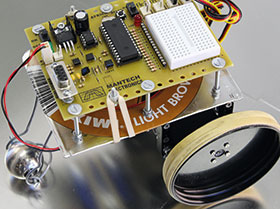

Young people who enjoy building and programming robots are often good candidates for engineering and technology university courses.
Young people who enjoy building and programming robots are often good candidates for engineeringand technology university courses.
However, most robotics kits are so costly that few South Africans have the means to enter competitions: a typical global competition robot costs upwards of $1000.
A clever robot does not have to be that expensive though, according to the RobotScience project at TechnoLab, Michael Ettershank, who says the microprocessor or ‘brain’ used in global competitions can easily be built into a robot costing a fraction of the price, at around R1500 or $100.
School learners have used Kiwi shoe polish tins, peanut butter jar lids and rubber bands to construct some of the desktop robots on display at Technolab’s facility, which is on the Kingsway campus of the University of Johannesburg (UJ) and forms part of the UJ Faculty of Engineering and the Built Environment. This sort of ingenuity will be put to the test at Technolab’s AfrikaBot robotics competition, due to be launched at Zwartkops Raceway near Centurion on 3 October 2015.
“To make robotics training and AfrikaBot accessible, the P1X8 robot is made partly from junk you may have lying around, while you build the electronics yourself from parts you can order online. You can choose to program the controller microchip with free text or graphical software available on the Internet,” explains Ettershank.
Teams may use a variety of robotics kits, including the P1X8 AfrikaBot kit developed at UJ TechnoLab, Parallax Basic Stamp, Arduino, Lego and others. Smartphones, tablets or other computers may be used to program the robots. Coders have the choice of Android, Apple iOS, Linux, BASIC, C, Java, Python and others to choose from.
The scoring system will favour robots with home-built electronics like the AfrikaBot which encourages young people to learn about electronics. The winning robot will drive itself autonomously through an electronically timed maze, but may only touch against the maze in designated places.
To enter the competition the robot must use rechargeable batteries, must be made with something recycled, and must fit through the maze tunnel. Robot parts made on a 3D printer will be permitted to encourage innovative design.
Young people across Africa, and from developed countries like the USA and Europe, are all invited to enter the AfrikaBot competition, the first edition of which is scheduled for October 2016. “Learners from high schools, colleges and universities have a whole year to build and customise their robots for AfrikaBot 2016,” continues Ettershank.
Certainly, South African learners are likely to give their counterparts tough competition. Says Ettershank: “In 2013 teenagers Dylan Rheeders and Marco Pretorius, who trained with RobotScience for two years, were placed second at the World Robotics Olympiad in Jakarta (Indonesia), beating a team from Germany that was sponsored by BMW AG.
“By the time you’ve completed the first training module with us you will have a good basic understanding of electronics,” he promises aspiring students. “Once you’ve completed the more advanced training you will be able to control solar energy equipment and basic industrial machinery.”
According to Carl Rheeders, father of Dylan Rheeders, “International robotics competitions are amazing experiences for the kids competing. They meet their peers from all over the world and figure out ways of communicating, even if the one speaks English and the other Russian. Also, engineers from international companies come and ask the young competitors questions – their presentation skills have to be as good as their technical skills!”
Rheeders’ two sons have both competed internationally, after receiving uniquely in-depth technical robotics training from Ettershank. Rheeders senior started a robotics club with Ettershank at his sons’ school.
In July 2015, TechnoLab entered into a partnership with the South African Institute of Electrical Engineers (SAIEE) that will see disadvantaged learners get the opportunity to build their own robots, learn how to program them, participate in AfrikaBot 2016 and get excited about a career as an engineer.
For more information contact Therese van Wyk, University of Johannesburg, +27 (0)11 559 6332, [email protected]

© Technews Publishing (Pty) Ltd | All Rights Reserved